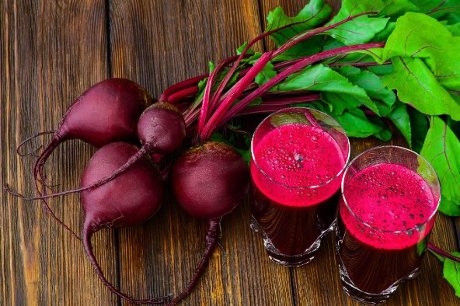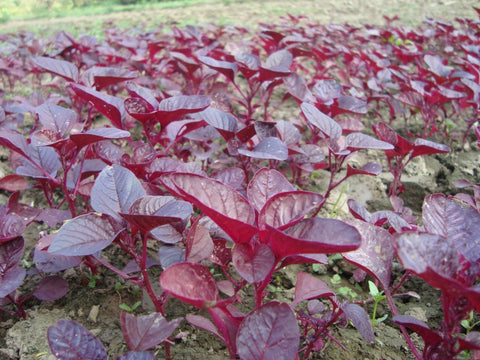Beets Nutrition Facts
Beets nutrition facts are well documented in scientific studies. Sometimes, however, science doesn't always make headlines. For those interested in knowing more about valuable beet nutrition data, we're sharing beets nutrition facts everyone should know.
Both long-term and short-term beetroot juice supplementation can positively impact a host of body functions, from our cardiovascular system to how we breathe, metabolic support, and organ function. The nutritional makeup of beets and their nitric oxide boosting abilities can have the power to turn around the effects of poor lifestyle choices like a bad diet and inactivity.
Long-term consumption of beetroot juice can be even more beneficial. One study on cyclists demonstrated that chronic high-dose nitrate supplementation improves cycling performance of well-trained cyclists in both normoxia and hypoxia (normal and below-normal oxygen environments).
Beets nutrition data
Packed with fiber, antioxidants, and nitrate, beets contain an incredible amount of vitamins and minerals.
Chart for Beets Nutrition Data: beetroot and its byproducts (per 100 g or L)
|
Raw |
Cooked, boiled |
Canned |
|
|
Water, g |
87.58 |
87.06 |
90.96 |
|
Energy, kcal |
43 |
44 |
31 |
|
Protein, g |
1.61 |
1.68 |
0.91 |
|
Total fats, g |
0.17 |
0.18 |
0.14 |
|
Carbohydrate, g |
9.56 |
9.96 |
7.21 |
|
Fiber, g |
2.8 |
2 |
1.8 |
|
Sugars, g |
6.76 |
7.96 |
5.51 |
|
Calcium, mg |
16 |
16 |
15 |
|
Iron, mg |
0.8 |
0.79 |
1.82 |
|
Magnesium, mg |
23 |
23 |
17 |
|
Phosphorus, mg |
40 |
38 |
17 |
|
Potassium, mg |
325 |
305 |
148 |
|
Sodium, mg |
78 |
77 |
194 |
|
Zinc, mg |
0.35 |
0.35 |
0.21 |
|
Vitamin C, mg |
4.9 |
3.6 |
4.1 |
|
Thiamin, mg |
0.031 |
0.027 |
0.01 |
|
Riboflavin, mg |
0.04 |
0.04 |
0.04 |
|
Niacin, mg |
0.334 |
0.331 |
0.157 |
|
Folate, μg |
109 |
80 |
30 |
|
Total phenolic contenta |
255 |
238 |
192 |
|
Total flavonoid contentb |
260 |
261 |
173 |
Beets nutrition facts chart

Beetroot fiber and protein
Beets are a moderate source of dietary soluble and insoluble fiber. One cup of beetroot contains about ¾ grams of fiber, supporting healthy gut bacteria and adding bulk to stool. Also beets are a moderate source of protein, containing about 2.2 grams per cup.
Beetroot antioxidant contents
An important consideration of beets nutrition facts is their richness in phytochemical compounds, or antioxidants, including carotenoids, phenolic acids, flavonoids, and betalains.
Vitamin C
Beets contain high levels of vitamin C. When paired with oranges; it's a duo packed in high concentrations of ascorbic acid. The antioxidant levels in beetroot and the type of high antioxidant food it is partnered with help extend the life of nitric oxide in the body. Nitric oxide is a short-lived gas that lasts just seconds from the moment it’s produced, and antioxidants help nitric oxide live longer.
Betalains in Beets
Betalains are the showstopper antioxidant of beets, the vibrant color provider. Beets, amaranth, opuntia cacti (prickly pear), and swiss chard are some of the most known edible sources of betalains. All familiar sources of betalain contain the vibrant bioactive red-violet pigment. The pigment has been widely explored for its benefits, including as a workout-related anti-inflammatory which also reduces oxidative stress.
Over 80% of the pigment in beets are betacyanins, betanin and isobetanin covering the color spectrum from pink to red with a pH of 4-6. Betalains are sensitive to heat and can degrade when heated above 122°F.
Carotenoids
The carotenoids present in red beetroot are β-carotene and lutein; these are robust antioxidants with several properties to help with fighting free radicals. Red carotenoids in beets contain lycopene but are not as strong of a source of lycopene as guava, watermelon, grapefruit, papaya, and cooked tomatoes.
Phenolic acids
Beets are a significant source of phenolic acid which is absorbed through the intestinal tract, and acts as a potent antioxidant, protecting cells from damage. Phenolic acid is excellent for sports recovery because it contains anti-inflammatory properties that aid in muscle recovery.
Flavonoids
Beets contain flavonoids, a group of bioactive compounds found in plants. Flavonoids are rich in antioxidants and widely found in many fruits and vegetables. In addition to their toxin fighting abilities, flavonoids also modulate key enzymatic pathways in the body and are used for maintaining health. Flavonoids can also be found in nuts like pecans and pistachios, seeds like sunflower seeds, and various spices. like cloves and saffron.

Beets reduce oxidative stress
The antioxidants in beets work to reduce oxidative stress, which is the disturbance of free radical production and antioxidants. Beets do this by strengthening endogenous (internal) antioxidant defenses. In normal conditions, cells are in a state of redox (chemical reactive) balance between reducing (antioxidants) and oxidizing (pro-oxidants) agents - also called free radicals. Oxidative stress causes an imbalance to this equilibrium, making cells susceptible to damage. Consuming beets as a regular part of a diet helps keep oxidative stress in check.
Beet nutrition for athletes
Another considerable amount of research has been invested in beetroot juice for athletes, and for a good reason. Beets can be an athlete's best friend, both helping with performance and recovery. Primarily used for the nitrate content that boosts nitric oxide levels, beets help athletes increase oxygen to the body and lower the oxygen necessary to perform high-stakes physical activities.
Beetroot juice consumed by athletes has been shown to:
- increase time-to-exhaustion rates
- improve efficiency and performance
- improve cardiorespiratory performance
- increase endurance by 16%
Intake of beetroot juice should be initiated within 90 min before an athletic effort.
The impact of nitrate-rich foods on reducing the body's need for oxygen may be hard found in other supplements or with training alone.
Dietary nitrate

A core benefit of beets is their dietary nitrate concentration. Thousands of studies have proven the efficacy of beets for sports performance. But it's not just great for sports; the nitrate concentration in beets can help with longevity and overall health via its nitric oxide boosting capability. There are many ways to increase nitric oxide, and one of those ways is through increasing nitrate intake from vegetables. Beets contain one of the highest levels of nitrate. Other nitrate-rich vegetables include red spinach, swiss chard, and arugula.
It is essential to know how nitric oxide works and how beets increase nitric oxide production. Our bodies function correctly because of neurotransmitters, which are chemicals from our brain that communicate with our entire body. Nitric oxide gas is a neurotransmitter also called a signaling molecule that communicates between cells in our body. Nitric oxide plays a vital role in the cardiovascular and respiratory systems. Beet nutrition data demonstrates that supporting the health of these systems is supported by consuming more beets.
Beets nutrition facts are important to know, as they are associated with numerous health benefits like exercise performance and longevity. Everyone can benefit from the power of beets, consuming beets daily whether in foods or juices is a wise way to support numerous functions in the body.
Resources
Mirmiran, P., Houshialsadat, Z., Gaeini, Z., Bahadoran, Z., & Azizi, F. (2020). Functional properties of beetroot (Beta vulgaris) in management of cardio-metabolic diseases. Nutrition & metabolism, 17, 3. https://doi.org/10.1186/s12986-019-0421-0
Sadowska-Bartosz, I., & Bartosz, G. (2021). Biological Properties and Applications of Betalains. Molecules (Basel, Switzerland), 26(9), 2520. https://doi.org/10.3390/molecules26092520
Vacher-Weiss, Margaret. (2019). The Effects of Beetroot Juice Consumption on Maximal Oxygen. Consumption. In BSU Honors Program Theses and Projects. Item 403. Available at: https://vc.bridgew.edu/honors_proj/403. Copyright © 2019 Margaret Vacher-Weiss
Rokkedal-Lausch, T., Franch, J., Poulsen, M. K., Thomsen, L. P., Weitzberg, E., Kamavuako, E. N., Karbing, D. S., & Larsen, R. G. (2019). Chronic high-dose beetroot juice supplementation improves the time trial performance of well-trained cyclists in normoxia and hypoxia. Nitric oxide: biology and chemistry, 85, 44–52. https://doi.org/10.1016/j.niox.2019.01.011
Agric. Food Chem. 2020, 68, 42, 11595–11611. Publication Date:October 11, 2020. https://doi.org/10.1021/acs.jafc.0c04241. Copyright © 2020 American Chemical Society
Płatosz, N., Sawicki, T., Wiczkowski, W. (2020). Profile of Phenolic Acids and Flavonoids of Red Beet and Its Fermentation Products. Does Long-Term Consumption of Fermented Beetroot Juice Affect Phenolics Profile in Human Blood Plasma and Urine?. Polish Journal of Food and Nutrition Sciences, 70(1), 55-65. https://doi.org/10.31883/pjfns/116613
University of Exeter. (2009, August 7). Beetroot Juice Boosts Stamina, New Study Shows. ScienceDaily. Retrieved March 30, 2021 from www.sciencedaily.com/releases/2009/08/090806141520.htm
Kozłowska, A., & Szostak-Wegierek, D. (2014). Flavonoids--food sources and health benefits. Roczniki Panstwowego Zakladu Higieny, 65(2), 79–85.
Rahimi, P., Abedimanesh, S., Mesbah-Namin, S. A., & Ostadrahimi, A. (2019). Betalains, the nature-inspired pigments, in health and diseases. Critical reviews in food science and nutrition, 59(18), 2949–2978. https://doi.org/10.1080/10408398.2018.1479830
Bolling, B. W., McKay, D. L., & Blumberg, J. B. (2010). The phytochemical composition and antioxidant actions of tree nuts. Asia Pacific journal of clinical nutrition, 19(1), 117–123.





Comments (0)
There are no comments for this article. Be the first one to leave a message!